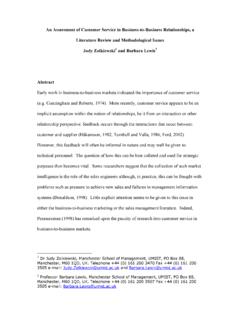Transcription of An Analysis of Entrepreneurial and Business Skills …
1 International Review of Social Sciences and Humanities Vol. 3, No. 2 (2012), pp. 236-247 ISSN 2248-9010 (Online), ISSN 2250-0715 (Print) An Analysis of Entrepreneurial and Business Skills and Training Needs in SMEs in the Plastic Manufacturing Industry in the Eastern Cape Province, South Africa Bola Afolabi (Corresponding Author) Adjunct Professor Faculty of Management and Commerce, Department of Business Management, University of Fort Hare, P. Bag X1314, Alice 5700, South Africa E-mail: Richard Macheke Department of Business Management, University of Fort Hare, P. Bag X1314, Alice-5700 E-mail: (Received: 5-4-12 / Accepted: 26-4-12) Abstract Small and Medium Enterprises (SMEs) are very vital in the development of today s global.
2 They contribute significantly in terms of creating jobs, Gross Domestic Product (GDP) and social welfare of most economies. However, there is high rate of failure among SMEs due to various reason of which lack of Skills is one. The study at hand was undertaken to find out whether training in Business and Entrepreneurial Skills could help SMEs to succeed. The study analysed the Entrepreneurial and Business Skills and training needs in the Plastic Manufacturing Industry in the Eastern Cape Province, South Africa. A quantitative approach was used in which 74 questionnaires were result showed that there is strong linked between training in Entrepreneurial and Business Skills and success of such organisation.
3 The results also showed that despite the linkage between success and training, most of the organisations still have a lot of unskilled workers in their pool. The research concluded with a strong argument for training as an essential tool for determining organisation success, effectiveness and efficiency. Keywords: Entrepreneurial and Business Skills , training needs and SMEs. Introduction There are unique success factors that determine the efficiency and success of all large businesses.. Small and Medium Enterprises (SMEs) should apply these success factors to enable them survive and grow in an increasing ever economically challenging world.
4 These success factors manifest themselves in the Skills and leadership qualities that should be passed International Review of Social Sciences and Humanities, Vol. 3, No. 2 (2012), 236-247 237 on by entrepreneurs and Business owners to the employees and stakeholders for satisfaction of customer needs and service delivery. SMEs are a large contributor to global economies and their importance is noted in every country. SMEs make a substantial contribution to the economy in terms of job creation, GDP, investment and social welfare (Nieman, 2006). According to the African Development Bank (2005), SMEs contribute more than 55% of total employment and 22% of the Gross Domestic Product in South Africa.
5 Since they are so important to the economy, their creation is very important as it a positive move towards economic growth. However there is a need to keep these SMEs in operation and avoid failure. Lack of Skills has been a major challenge to the SMEs (Smith & Perks, 2006) and Skills acquisition through training can provide a long lasting solution to the survival battle of the SMEs. Due to various reasons, some SMEs end up closing down Business at an early stage. This could result from the view that the entrepreneur miscalculated the opportunity, and unforeseen threats that are too big for the Business to overturn, lack of essential information on running the Business and lack of proper funding of the Business (Chimucheka and Rungani, 2011; Monk, 2000).
6 There are a lot of other issues that may appear insignificant when the Business is launched but will overpowering the Business at the end, and eventually leading to its downfall. Seemingly there is a lot that needs to be done in all fields that may prevent the loss of jobs, revenue and increase of poverty in the communities by preventing failure in the SMEs. Apart from the financial problems that may affect the businesses, the input of the owner and the Business Skills (Smith & Perks, 2006) are very important in keeping the Business afloat. There is therefore a need for a study that provides a rigorous and systematic Analysis of Entrepreneurial and Business Skills and training needs in the Plastic Manufacturing Industry in the Eastern Cape Province of South Africa.
7 The purpose of this study is to examine the important Entrepreneurial Skills and the impact of training in the success of the Business . This study will help new SMEs in the industry to be able to survive and keep growing, thus benefiting the province in development, employment and the country in revenues. These Skills do not only promote Business and manufacturing efficiency success but also efficiency and benefit the country at large. Therefore, it is, of great importance to assess and specify success factors that promote efficiency and survival of SMEs that could serve as benchmarks for emerging SMEs. It goes further to assess whether training can play role in the acquisition of these Skills by entrepreneurs.
8 Research Problem The success of SMEs is mainly attributed to the ability of the manager/owner in guiding the Business through to success. For a firm to be prosperous, it should be well-managed while the entrepreneur should acquire the necessary resources to drive the Business . SMEs are most vulnerable in terms of survival because of the liability of newness and smallness (Kangasharju, 2000). Empirical evidence have shown that the life span of SMEs tends to be short, with approximately two thirds of all start-ups failing within the first five years (Ladzani and Van Vuuren, 2002). Only small percentages stay in Business in the long term, with many of the survivors achieving only marginal performance (Freeman, 2000).
9 The opportunity for SMEs to create wealth will be missed if they cannot attain their potential (Fielden, Davidson & Makin, 2000). Despite the challenges and difficulties of the SMEs, the sector has great potential for increased employment creation. While many SMEs fail, others survive beyond infancy and adolescence, becoming major success stories, creating wealth for their founders and jobs for the communities they serve (GEM, 2005a). The employment record of SMEs would improve if, instead of failing, they could be assisted to reach a steady growth path (Kangasharju, 2000). If SMEs are to be vehicles for wealth and job creation they should be started, sustained and grown (Luiz,2001).
10 The key challenge facing the South African government is how to promote and support the creation of more SMEs with growth potential and at the same time help those SMEs that are surviving to reach advanced levels of efficiency and profitability (Darroch, M. and Clover, 2005). The aim Bola Afolabi et al. 238 should be to achieve Entrepreneurial growth resulting in a net-firm creation, that is, firm-expansion exceeds the contraction of existing SMEs. This study investigates key success factors that cause SMEs in the Plastic Manufacturing Industry to succeed, to maintain profitability and to sustain employment opportunities.







